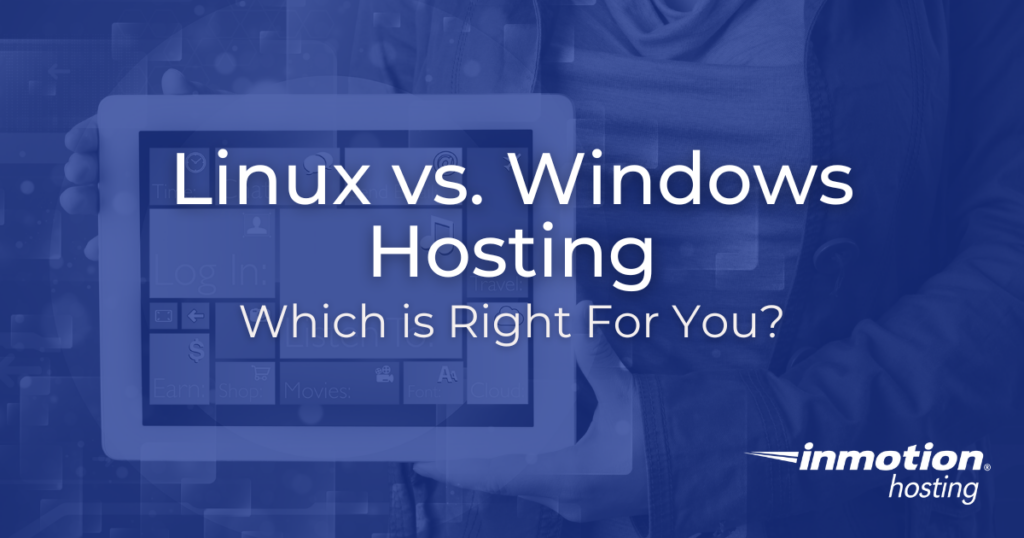
Choosing between Linux or Windows Server for your website or application is a crucial decision that impacts performance, security, and scalability. Both operating systems (OS) have unique strengths and cater to different needs, but how do you decide which one is right for your project? This guide will help you understand the key differences between Linux and Windows Server and empower you to make an informed decision about your server OS.
- Linux vs Windows Quick Comparison
- Understanding Linux Hosting
- Understanding Windows Hosting
- Linux or Windows: How to Choose?
- Why Choose Linux Hosting with InMotion Hosting
- Conclusion
Linux VPS vs Windows Quick Comparison
Linux and Windows are two popular operating systems used for web hosting. Here’s a quick comparison to highlight their key differences:
| Feature | Linux Server | Windows Server |
|---|---|---|
| Stability | Highly stable with minimal downtime | Stable but may need more frequent reboots |
| Security | Less vulnerable to malware Requires robust antivirus tools | May need more security configurations |
| Customization | Fully customizable with open source tools | Requires Windows-specific technologies |
| Ease of Use | Requires command line knowledge | User-friendly with a graphical interface |
| Software Support | Ideal for PHP, MySQL, Python, Ruby | Best for ASP.Net, MSQL, and .NET apps |
| Resource Usage | Efficient resource use | More resource-intensive |
| Cost | Free OS with no licensing fees | Licensing fees required |
| Use Cases | Web hosting, development, databases | Enterprise applications, Windows-based software |
Both offer advantages but ultimately the decision should align with your hosting requirements.
What is Linux Hosting?
Linux hosting refers to servers that run on the Linux operating system, an open source platform built around the Linux kernel. Linux distributions, like Ubuntu, are known for their stability, flexibility, and security features. It is a favorite among developers and businesses seeking cost-effective and reliable hosting solutions.
Advantages of Linux Hosting
- Customization: Linux is highly customizable thanks to Open-source software and tools that allow extensive server customization to meet specific needs.
- Cost-Effectiveness: No licensing fees make Linux a budget-friendly choice.
- Reliability: Its efficient resource management ensures consistent performance with minimal downtime.
- Security: Linux’s architecture and regular updates make it less susceptible to cyberattacks.
Check out our eBook on Critical Steps to Secure Your Linux VPS
Disadvantages of Linux Server
- Learning Curve: Linux can be challenging to learn, particularly for those accustomed to Windows. However, with dedication and online resources, mastering Linux server management is achievable.
- Compatibility: While Linux supports many applications, compatibility issues may arise with software designed exclusively for Windows. Nevertheless, workarounds are often available within the Linux ecosystem.
What is Windows Hosting?
Windows hosting uses the Windows Server operating system, developed by Microsoft. It’s often chosen for its user-friendly interface and compatibility with Microsoft technologies.
Advantages of Windows Servers
- Familiarity: Easy to use for those accustomed to Windows products.
- Microsoft Integration: Seamlessly supports ASP.NET, MSSQL, and other Microsoft tools.
- Remote Desktop Access: Built-in support makes server management convenient.
Disadvantages of Windows Servers
- Security: Despite improvements, Windows is more prone to malware and requires frequent updates.
- Resource Demands: Windows servers can be more resource-intensive and often need more powerful hardware to operate efficiently.
- Licensing Costs: Unlike Linux, Windows VPS entails licensing fees which can increase the overall expense.
Linux or Windows Server: How to Choose?
Your choice between Linux and Windows Server depends on your project’s requirements, budget, and technical expertise. Consider the following factors:
- Application Requirements: If your project relies on open-source technologies like PHP or MySQL, Linux is ideal. For Windows-specific tools like ASP.NET, choose Windows.
- Budget Constraints: Linux is more cost-effective due to the absence of licensing fees.
- Ease of Use: Windows offers an intuitive Graphical User Interface (GUI), while Linux may require command-line knowledge.
- Scalability and Security: Linux is better for scalability and security, especially for web hosting and development projects.
Why Choose Linux Hosting with InMotion Hosting?
At InMotion Hosting, we specialize in Linux-based solutions that deliver performance, security, and reliability. While we do not offer Windows servers, our Linux servers are designed to meet the needs of developers, small businesses, and enterprises alike.
- High-Performance Servers: Optimized for speed and uptime.
- Enhanced Security: Built-in protections against malware and cyberattacks.
- Cost Savings: No licensing fees help reduce business expenses.
- Expert Support: 24/7 assistance from our experienced team.
If you’re considering running Windows applications on a Linux server, be aware that you’ll need software licenses and will be responsible for server management.
Conclusion
The choice between Linux or Windows Server ultimately comes down to your specific needs and preferences. Linux is a secure, flexible, and cost-effective option for most web hosting and development projects, while Windows excels in compatibility with Microsoft technologies and ease of use.
At InMotion Hosting, we’re committed to providing robust Linux solutions to help your project thrive. Explore our plans today and experience the benefits of Linux hosting for yourself!